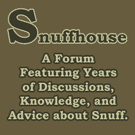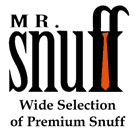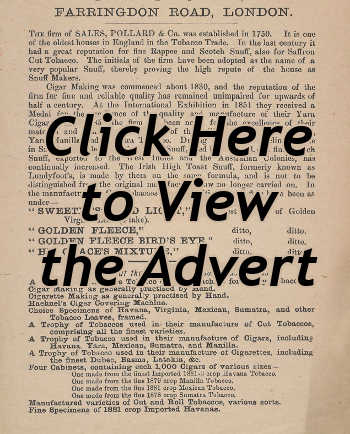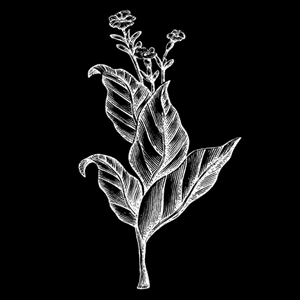
|
PAGES |
The Origin of "S.P." The following essay was compiled by "Philip S" and posted on the Snuffhouse Message Board. I had read it a few years ago, but recently it was returned to my attention by Alex F. Iversen. You will hear many theories, but to my mind this is the most solid of the theories, and the one most supported by evidence. Snuffs bearing the initials S.P have caused much speculation as to what they stand for. The answer, however, is that S.P stands for ‘Sales Pollard’. Even the unsuccessful attempt to register S.P as a trademark by the company (see below) admits that Sales Pollard were the originators of the well-known snuff label. Here is the unremarkable truth behind those mysterious letters. Joseph Sales was a partner with John Pollard (1740-1817) in a firm of Tobacco and Snuff Manufacturers, Sales Pollard & Co., of Aldersgate Street, London, originally established by Sales in 1750. Their business is listed in the Directory of London and Westminster, & Borough of Southwark of 1794. The business flourished, greatly expanding long after the original founders died. Even during their lifetime their business was the largest of its kind in London. In ‘The Structure of Industry in London, 1775-1825’ David Barnett writes that: “In terms of capital insured, by far the largest business in the 1770s was Joseph Sales, John Pollard and William Yates, tobacconists of 71-2 Aldersgate St. They insured stock and utensils for £ 13,500 in 1777. The next largest tobacconists were Robert Rayner and Robert Davies of 2 Aldgate Within who insured stock, utensils and goods for £3800 in 1769.” When other snuff chandlers were insuring themselves for less than £200, Sales Pollard & Co.'s insured amount for £13,500 gives a suitable impression of just how large and profitable the business had become by 1777. Until 1790 John Pollard was chairman of Manufacturers of Tobacco and Snuff, Resident in London, Westminster and Southwark. The company was mentioned a number of times in Parliament and the popularity of their snuff so great that other manufacturers were willing to part with £20,000 in 1790 for their secret. From the House of Commons, 1790... “When the [snuff] manufacturers did him [Mr. Fox] the honour of a visit, they all uniformly and invariably stated, that Messrs. Sale[s] and Pollard were in possession of a secret in giving a peculiar flavour to snuff, for the purchase of which they should think 20,000l., if they could conveniently spare the money, well laid out.” In an attempt to give their flagship snuff a particular brand the letters of the company were used. Exactly when S.P was first marketed is unknown but must have been before Sales Pollard became Sales, Pollard & Co. In an advertisement for Sales, Pollard and Co. dated 1884 the text explains that: |
“The firm of SALES, POLLARD & Co was established in 1750. It is one of the oldest houses in England in the Tobacco Trade. In the last century it had a great reputation for fine Rappee and Scotch Snuff, also for Saffron Cut Tobacco. The initials of the firm have been adopted as the name of a very popular Snuff, thereby proving the high repute of the house as Snuff Makers.”
Source: Advert for Sales, Pollard & Co
It is stated in the authoritative 1881 journal ‘Tobacco Whiffs for the Smoking Carriage’ that S.P snuff is named after Sales Pollard before they were renamed Sales, Pollard & Co, moving to Farringdon Street in 1871, and becoming what was possibly the largest tobacco manufactory in Britain. The text states that:
“Among the specialities manufactured by the firm, so often mentioned in this chapter, is the "S. P." Scotch snuff, originally manufactured when the house was known only as Sales & Pollard, the initial letters of which names were used to give a "brand" to this particular article. This snuff, however, was imitated by other houses before the present law as to trademarks was in force, and is now sold in large quantities, under the same brand, to the detriment of those who, though they are morally entitled to the exclusive enjoyment of the notoriety obtained by the article in question, have no legal remedy.”
Source: Tobacco Whiffs for the Smoking Carriage
The legal remedy referred to in the above text was attempted in 1875 when Sales Pollard was moved to register S.P as a trademark. Alas, they were too late in their application for the reason given above. The 1878 result of the 1875 trademark application is as follows:
62O. Ex parte Sales Pollard & Co. [T. M. A. 1875].
July 8, 1878. Jessel, M. R.
“ON motion by the registered proprietors of a trade-mark on snuff, consisting of the letters "S.P." (the initials of the firm), which they had discovered, subsequently to registration, to have been in common use for many years in the snuff trade, though used originally by themselves : Leave given to rectify the register by striking out the mark in question.”
Source: A Manual of Trade Mark Cases by Rowland Cox
The Sales & Pollard trade-mark dispute over S.P snuff is cited in The Yale Law Journal Volume 20 No.1 of 1910 as an example of terms held publici jurus. The text explains that -
“Publici jurus words frequently used by tradesmen in a certain line of goods are said to be common to the trade. Of course, the true test is whether the use of the word “has ceased to deceive the public” as to the maker of the article and whether the word is current in the market amongst those “who are more or less directly connected with the use of the commodity to which the word is applied......Where three people use the name and at least two of them innocently, there is no proprietorship.”
Source: Yale Law Journal
But the true origin of S.P is also recorded in The Parliamentary Papers: Volume 39, page 60.
“1511. What is the real meaning of S.P., is it a trade brand? - S.P. refers to Sales and Pollard. Those letters are the initials of the manufacturers who were the originators of that kind of snuff. There is no trade mark in them but people have stuck to the initials.”
But people have stuck to the initials! So there we have it. Sales Pollard, operating before brands could be trade-marked, lost proprietorship of the name S.P. due to two or more competitors using the same name. Interpretations of S.P as standing for Spanish Prize or Sheffield Pride – neither of which can be qualified by any evidence - or any of the other suggestions may be discounted in favour of the less glamorous Sales Pollard – once Britain’s largest tobacco manufacturer, now no longer existing even in memory. W.D. & H.O. Wills & Sons acquired the business in 1893 and it ceased to exist as a company.
Hopefully, when next taking a pinch of S.P, suitable dedication may be made to the moral entitlement of Sales Pollard to the snuff that still bears their initials. It is their final epitaph.
SPECIFIC NOTE ON THE VIGO ACTION: Many books and articles claim the Vigo action of 1702 as the source of SP (here meaning "Spanish" or "Spanish Prize") after Admiral Sir George Rooke captured hundreds of casks of fine Havana snuff, which were sold according to Prize Law in English ports and cities. This event is perfectly true, but what and where are the original sources to confirm that it was sold specifically as the abbreviation for Spanish? All early sources state that the 1702 booty was sold in England as "Vigo Snuff" at three or four pence a pound, and described as “gross snuff from the Havannah“. The book ‘Social life in the reign of Queen Anne: Taken From Original Sources’ by John Ashton, for example, details the Vigo operation and its commercial aftermath but makes no reference to either Spanish snuff or the alleged abbreviation. (pages 158-159). In other words there is no evidence whatsoever to link the Vigo plunder with snuff abbreviated to SP: the claim only has a basis in myth, and repetition of that myth.
If you have any suggestions for this page or comments on this theory or other theories explaining the origins of "S.P.", please feel free to click the button above. And don't forget to visit the Modern Snuff Blog and Facebook Group.
Modern Snuff © 2015, 2016, 2018 by Mark Stinson





